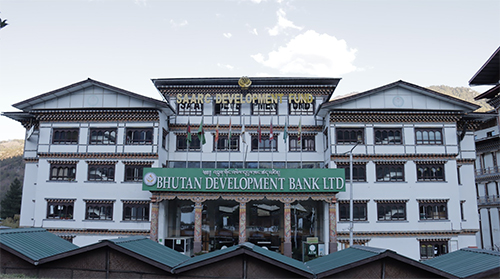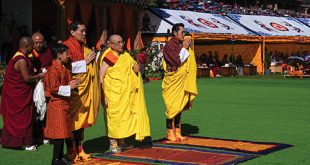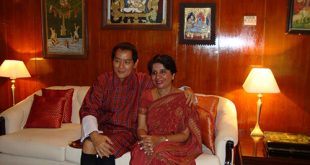An anonymous account called ‘Drukpa Dorje’ has been creating a flutter online with detailed posts on loans taken under the Economic Stimulus Plan (ESP).
Ordinarily, The Bhutanese would ignore anonymous posts without any proof, but the Opposition Party and the Government both asked the Anti-Corruption Commission (ACC) to investigate allegations based on such posts, and secondly Drukpa Dorje appears to have access to confidential ESP loan details.
The Bhutanese decided to verify some of the information based on available data and interviews with the Bhutan Development Bank Limited (BDBL), the loan recipients and some other Financial Institutions.
The Yellow List
Drukpa posted a yellow colored screen shot of some ESP recipients and raised questions on why businesses like groceries, hardware, and handicrafts still managed to receive ESP loans when only agriculture, production, and manufacturing were supposed to get ESP loans under the ESP criteria.
The list says Choda (grocery and related products) got Nu 2.9 million (mn). Here, BDBL management clarified that the loan was for meat processing which is eligible under ESP and ‘grocery and related products’ heading had been used to indicate that the end product would be a grocery item and it does not mean it is a grocery business.
The list also pointed out Sonam Tandin Phurba (Groceries and other Related Commodities) getting a Nu 5.09 mn loan. Here, BDBL said it was a loan for food grain processing into flour, which is eligible, and the end product would be a grocery item.
There is then a Karma Dorji (hardware/construction) who got a Nu 1 mn loan. BDBL said the loan was for making furniture which is eligible.
There is then a Sonam (Garments, Textiles and Jewelries) who got a Nu 4.960 mn loan. Here, BDBL said Sonam would be making prayer flags which would result in import substitution like the above cases.
There is a Chencho (electronic, home furnishing) who got Nu 8.9 mn loan. The loan was given by the BoB under the ESP for the company Norgu lights for the manufacture of light bulbs.
A Lobzang Jimba (electronics, home furnishing) got a Nu 1.660 mn loan. This loan was also given by BoB under ESP for Dapa production.
Drukpa questions a Nu 21.4 mn loan to Serkar Dairy Pvt Ltd saying that according to their website, the company has been operational only since September 2023. Drukpa says as per the RMA and bank documents checklist, and ESP guidelines 12(N), it clearly requires: “Audited financials for the past 3 years for an existing business,’ and Drukpa says being less than 3 years old, they could not have met this requirement which shows they were not eligible for the ESP loan.
The BDBL management clarified that there is no ESP loan condition saying that only companies three years and older will get the loans, but 12(N) means that if there is an existing company that wants to scale up or do a new thing then it would have to provide the audited financials for the past three years, but obviously the numbers of years would be lesser for a newer company.
In the list, Drukpa raised the same question about how Bhutan Biscuits and Gourmet got a Nu 90 mn ESP loan from T-Bank when it started in 2024 and also said it is not a new business as it was in operation for six to seven months when it received such a huge loan. Here, a T-Bank official said the company was eligible under the ESP guidelines and met its criteria. Bhutan Biscuits has a factory in Wangdue using European machines employing 30 to 35 workers and producing 10 to 15 biscuit and cookier varieties under the KinTen brand. The biscuit is known for its international style packaging and competes with imported biscuit and cookie brands.
From the same list, in another post Drukpa points out that the head of Chukha Ferro, Ugay Tshering (DPT MP for Bongo-Chapcha from 2008-13), got a Nu 69.5 mn loan for animal feed. Drukpa alleges decades earlier Ugay Tshering had taken a BOIC loan for a mineral-water project that remained only in name, and only now there is renewed activity.
Ugay Tshering told this paper that he never took any loan from BOIC for the water plant and instead the plant was funded by a Nu 10 mn commercial loan from the BNB. He said the water plant is operational, and with his consent, the paper verified with BNB that the water plant loan is from BNB. He also said that he, in fact, never took any BOIC loan at all and said the allegation is defamation and has mentally disturbed him.
Another anonymous account questioned the animal feed loan size saying the biggest feed machine costs around Nu 6 mn from China and the construction shed for this can be done at around Nu 8 mn.
Here, Ugay clarified that his animal feed plant located in Samdrupjongkhar is meant to supply animal feed in the eastern Dzongkhags as currently farmers have to travel to Gelephu and Phuentsholing to get feed. He said he is supplying feed for pigs, cattle, fish and poultry and each feed needs a different machine.
Drukpa then points to Soenam Yangchuk Pvt Ltd getting a Nu 89.49 mn loan for toughened glass manufacturing. He says Zim Zim Bhutan Foods and Snacks, run by the younger brother of the Toughened Glass ESP beneficiary, secured collateral-free loans (BOIC) and later declared bankruptcy and despite this the family still got an ESP loan.
Here, Soenam Yangchuk Pvt Ltd clarified that while Zim Zim Bhutan had to shut down due to the pandemic impact it is still paying its BOIC loan to BDBL and has not defaulted on its loan payments.
Drukpa then alleges that there are strong indications that part of this loan was diverted into a three-star hotel (Zhidey in Phuentsholing). Here, Soenam Yangchuk Pvt Ltd said that the hotel in question was a pre-pandemic hotel funded by BNB and it completed construction by the end of 2024 with operations from February 2025 onwards. The company said it only got the ESP loan disbursement in May 2025 and so said there is no link between the hotel and the toughened glass project.
When it comes to T&K’s Concrete Bricks Factory getting Nu 70.20 mn ESP loan from Bhutan Insurance Limited (BIL), Drukpa says that while T&K may have a good track record in other businesses, the brick factory goes against the loan approval goal of business viability. Quoting media articles, Drukpa says Bhutan already has more than 120 brick units, and most are not doing well.
Drukpa questioned the export potential citing heavy transportation costs, brick factories in Birpara and GST and that steam curing does not make much cost difference and the steam chamber that can make around 15,000 bricks a day cost around Nu 3 to 5 mn.
Drukpa alleges there is a high chance that the ESP loan was diverted into T&K’s five-star hotel project.
The owner of T&K, Thinlay Gyamtsho said his five star hotel in Babesa already has consortium financing from RICBL, BoB, BNB and T-Bank and the amount is much bigger and so there is no need or use to divert the money.
He said his is not a bricks factory but a concrete factory that will produce an array of items. He said his operations are of such a large scale that he will be supplying Project Dantak soon, and the Nu 70 mn ESP is not enough and he will have to cover the additional Nu 30 mn required for the project.
He showed the paper a certification for his company from the suppliers in India that his production capacity is fully automated at 60,000 concrete bricks in a day which can be scaled up to 100,000 bricks.
He said in the region, there is only one factory in Siliguri which comes close but it is old. He said just on technical advice he has to pay two experts USD 100 a day apart from hotels and others expenses for 2 to 3 weeks. He said his factory can make concrete blocks up to 8 inches thickness and his other products are concrete ready mix, wet casting, dry casting, culvert box, dry cast rcc etc. He said the unit also includes a batching plant.
He said their bricks are of BIS standards and can compete in India in terms of price and quality. Thinley invited the anonymous person to come visit his plant or send a representative, and he said he would not reveal the identity.
A BIL official they did a thorough financial assessment of the project, and only after being convinced that it is viable, the loan was given. The official said if an ESP loan goes into NPL then the Financial Institution would have to pay it back, and as a private Financial Institution this is something the management and shareholders would not tolerate.
When it comes to others in the list, Tandsing Wangchuk (Printing and Production Recorded Media) got a Nu 3.140 mn ESP loan from BoB for movie production, which is one of the ESP eligible sectors.
Zhambala Manure Manufacturing got a Nu 3.20 mn ESP loan from RICBL for vermicompost manure manufacture, which is eligible under ESP.
M/S Central Real Spring Water got a Nu 5.50 mn ESP loan from T-Bank for a mineral water plant, again eligible under the ESP criteria.
Questions on politicians and their relatives
Drukpa raised questions about Norwang Polyfab Private Limited in Jemina owned 50 percent by Lyonpo Tandin Wangchuk’s son and 50 percent by Norbu Dhendup’s mother. The factory has two units with two separate licenses under it. One unit is a High Density Polyethene (HDP) pipe factory financed by a Nu 104 mn commercial loan with collateral from T-Bank that is in the advanced stages and will manufacture commercially from 1st October 2025.
The second unit is for a Low Density Polythene (LDP) pipe factory that got Nu 72.7 mn as ESP loan from BDBL. Drukpa asked how the same person or group got two loans, and secondly that banks have a checklist for ESP where bank details of the last 6 months must be shown with Drukpa questioning how they passed this.
The BDBL management said for the Nu 72.7 mn ESP loan, the bank has done due diligence and visited the site and is releasing money only in phases as works get completed. They said the LDP is a completely different unit.
BDBL said the bank details of the last 6 months is to do with foreign currency and not normal bank transactions, as no ESP applicant is asked to submit bank transactions for 6 months. BDBL said what is important is the Credit Information Bureau (CIB) report to show the applicant does not have a Non Performing Loan.
Coming to the Prime Minister’s brother Tshering Wangchuk, Drukpa questioned the Nu 2.5 mn figure shared by him with The Bhutanese earlier for the transformer saying, “For such a factory size, it should be below 250KVA, which costs around 2.5 to 3 lakhs. If it is 500KVA, the maximum price is Nu 5 lakhs, plus extra cost for line extension, which I have seen is not much needed.”
Tshering Wangchuk said he paid Nu 2.7 mn to a private person for installing the whole package and not just the transformer. He said the transformer is 150 KVA with all the accessories, transformer deck, 12 poles, 120 mm UG Cable for 500 meters and transformer fencing installation cost.
There were also questions on the viability of his Nu 81 mn ESP funded project given there are 120 brick units in Bhutan with Drukpa saying the average cost to open one is below Nu 10 mn.
Here, Tshering said his is not a brick factory but Autoclaved Aerated Concrete blocks factory and there are another two factories with one in Pasakha and another in Gomtu and each of them cost Nu 270 to Nu 300 mn each.
Drukpa questioned how Tshering was allowed to use a part of the first installment of Nu 35 mn to pay two former partners. They had sent money for the machines to China, but later backed out and was paid by Tshering from the loan money.
Here, the BDBL said for them what matters is that they want to see the machines and the payment route does not matter for them.
In one post, Drukpa alleges that PDP’s new MP from the Nubi-Tangsibji Phuntsho Dendup was a former BDBL manager and was directly involved in approving ESP loans.
Here, the paper contacted Phuntsho Dendup who said that he had resigned as the BDBL Trongsa Branch manager in 30th June 2018 and since then he has had nothing to do with BDBL. He said that he was not even in the headquarters when he left BDBL. Phuntsho said that while the government mobilized the ESP fund, it has no role in disbursing the loans which are left to banks.
Phuntsho said the posts on the ESP started just after he won the bye election race.
He said, “Some people are assuming online allegations to be facts, but people should wait for the ACC to finish its job. People are presumed innocent until proven guilty as per the Constitution. However, even if ACC does not find anything there will be 20 to 30 percent who will still believe these online allegations and that is the unfortunate part.”
Phuntsho said that people affiliated to all parties and backgrounds have got ESP loans, and there are no ESP criteria saying that PDP members or supporters should not be given ESP loans.
He asked why Drukpa is being selective and not releasing information of a former MP from another party with two other partners being given a large ESP loan for a business.
Drukpa, in his post, alluded to the former Agriculture Minister Yeshey Dorji (2013-18) on the ESP issue asking the public for information on him.
When contacted by this paper, the former minister said he got an ESP loan along with other partners for a Medicinal Processing and Export Hub that will be located in Gelephu. He said one of the partners has technical expertise in this business. He said the BDBL did a thorough assessment and even sent teams to Menjong Sorij and National Biodiversity Center to do research in the viability of their proposal, and only after being convinced it was viable, they agreed to give the loan.
The BDBL management said that the political affiliation and background of applicants do not matter, and in fact, in the case of the Health Minister’s son, they only knew he was Lyonpo’s son after the anonymous posts linked the two and an official complaint was lodged with ACC.
BDBL Chairman responds
Drukpa in a post said the Chairmen of state enterprises, corporations, and banks hold disproportionate power over CEO appointments and reappointments and that concentration matters for who gets funded. Drukpa said the BOIC CEO at the time later became the BDBL Chairman, and when other banks hesitated to disburse ESP funds, BDBL stepped in. Drukpa said the sequence is troubling and needs independent scrutiny.
The BDBL Chairman Karma Tshering said that he was appointed to the BDBL Board by the former government starting from 21st September 2022 as a board member and then from June 2023 as the Chairman as the former Chairman resigned to join politics.
He said he was sought out by the former government as the then BDBL Board had only civil servants, and no one with banking experience. Karma was previously the BOIC head and prior to that the BOB head of operations.
He said the BDBL was in a crisis at the time he joined with record NPL leading to the RMA not allowing any lending and a Nu 500 mn annual loss. He said he worked hard as the Board member and later the Chairman getting only sitting fees and helped turn BDBL around, and now his reward is getting his name dragged through the ESP controversy.
Karma said he nor the board has any role to play in the ESP loans, as the ESP steering committee decides the guidelines and the BDBL management gives the loan. He said he has never called the BDBL management recommending loans for anyone. The BDBL management also said the Chairman has no role in loan disbursal.
Karma said that even his earlier appointment as the BOIC CEO was not a direct appointment but based on open competition with 14 applicants and a committee of senior bureaucrats appointing him.
Karma said it is dangerous that so much attention is being given to anonymous complaints, and even due process is not being respected.
He said with the government and opposition giving so much importance to anonymous complaints, they are not aware how much this is impacting people providing services in BDBL. He said in the future any anonymous account can make allegations against any public servant, and people will think it is true.
He said ESP is just one small aspect of the BDBL’s operations, as BDBL has to manage Nu 35 to 36 billion in portfolio and he asked what would happen to this if tomorrow BDBL team members decide to resign and go.
ACC collects information
Meanwhile, ACC has started collecting information on the case. According to sources, the ACC took the entire loan data base of the concessional credit loans. The ACC also took some selected loan files from BDBL and the agency is also talking to ESP loan officials to understand how the loans are given and what the process is.
 The Bhutanese Leading the way.
The Bhutanese Leading the way.





Drukpa bold statement seem to be a pillar of voice for voiceless and no amount of disinformation,no distortion of fact weigh be more weight then truth pops up in this burning issue come alive , if bigger fish which eats all the share are segregated legally and ethically there will be more room for general healthy fish to groom definitely I support this publication for better future Bhutan.